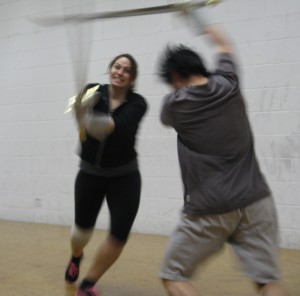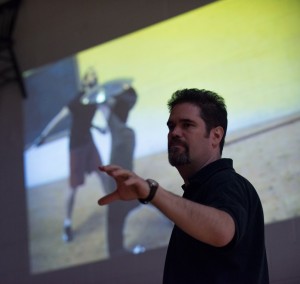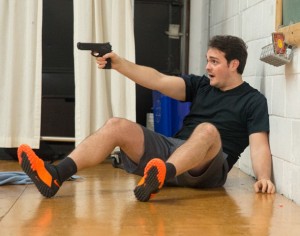Frequently Asked Questions
 Training at Rapier Wit – General Info
Training at Rapier Wit – General Info
I'm not an actor. Can I still participate?
Absolutely! Although this training is designed for actors, everyone is welcome. Our community has been enriched by people from all walks of life!
A word, though, if you’re considering stage combat certification courses: candidates are assessed in part on how they act the fight, and the standard gets higher as they progress through the levels. If you have no acting training but are interested in continuing through Intermediate and Advanced, you may at some point want to take classes in acting fundamentals (such as scene study and voice/text) to help build your technique. Your Rapier Wit instructors will be able to give you specific recommendations for supplementary training.
What kind of shape do I need to be in?
Don’t worry – you don’t need to be in Olympian shape to join us! There are no specific physical requirements for our sessions beyond your being in sufficiently good health to participate and partner safely. However, as with other physical endeavours, your general fitness can make things easier or harder in stage combat class. Some endurance is required for the certification courses and testing, especially for the intensive formats which involve long days. If you have concerns about your fitness or other issues (such as past injuries), please feel free to talk to us about them before you commit to a course.
What is the age range for participants?
Age ranges significantly for our participants, but you must be at least 18 to join our classes. If you’re under 18 and looking for training now, see Do you have kids’ classes?.
What do I need to bring/wear for classes?
Comfortable athletic clothing that you can easily move in is required. We will ask you to remove your jewelry, so you may want to leave it at home. Athletic shoes with non-marking soles are also required. Many participants bring a snack for extra energy. We usually have some snacks and drinks available at the studio for a small fee.
What are Monday Drop-Ins like?
These classes are intended for students of all levels, from beginners to professionals. They are self-contained evenings in which an instructor leads the class in a specific technique or weapon. The instructor may announce the class focus in advance, or may base the class on student requests. Beginners are welcome! If you want to get a taste of stage combat and a sense of our studio and community, a drop-in Monday night is the perfect place to start.
Do I need to be certified to attend Friday Fight Night?
Friday Fight Nights are open to students who have some level of FDC certification, or are currently in a Basic workshop. This is a chance for students to work their skills with other certified actor-combatants. These evenings are intended for self-directed practice, but an assistant or instructor will be on the floor for consultation.
Are one-on-one classes available?
Private training is available, although training with other students of your level is preferred. Private classes are recommended only for students with specific, short-term needs such as special audition or role preparation. Rates depend on your needs; contact us for a quote.
Do you have a kids' program?
The minimum age for participation in Rapier Wit classes is 18. However, our esteemed colleague Casey Hudecki of Temper Combat Performance Arts does offer a youth program with drop-in classes taking place at the Rapier Wit studio. Details are available on Casey’s website at
caseyhudecki.com/temperclasses.
What is Riot A.C.T.?
Riot A.C.T. is a screen-focused action performance team based here in Toronto. Riot A.C.T. is a great example of multi-disciplinary collaboration: its members pool filmmaking, dramatic combat and stunt skills to produce fabulous short fight films. Several of its members are also Rapier Wit instructors, and the team has kindly allowed us to post some of its short film projects on our
RW In Action page so that we can showcase their talents. For more information about Riot A.C.T., visit www.riotact.ca.
I can’t come to Toronto for training. Are there classes near me?
For information on FDC training across Canada, visit
www.fdc.ca. Looking for stage combat training outside Canada? We have colleagues in sister stage combat organizations around the world. Get in touch with us for more information.
 About Stage Combat
About Stage Combat
What is stage combat?
Stage combat is choreographed dramatic violence representing character tactics in a scene. It is designed to be performed by actors in a manner that is physically safe, dramatically engaging and appropriate to character and story.
So an actor-combatant is...?
An actor who is trained in stage combat. Actor-combatants study a wide range of armed and unarmed techniques along with the history, philosophy and distinctions of each style and weapon so that they can bring a high degree of specificity to their performances.
What's the difference between stage combat and stunt work?
First, there’s the element of risk: stunt performers assume a degree of physical risk in place of actors, whereas stage combat is performed by actors so must be relatively safe (and repeatable). Stunt work also often involves specialized skills and equipment (such as for high falls, driving, or fire burns) for which actors are not typically trained. Depending on what they’re doing, stunt performers don’t always have to portray the specifics of character; their first responsibility is executing the stunt. Stage combat, on the other hand, is one facet of an actor’s performance, so interpretation of the moves depends on the character and dramatic context.
Does Rapier Wit offer stunt training?
Specifically, no. We may occasionally offer workshops for skills that might be practiced by both stunt performers and actor combatants (such as whip or motion capture), or host information sessions by our colleagues in the stunt community for those interested in learning more about stunt work. In general, however, it’s not what we do. Our focus is stage combat.
Is stage combat just for theatre, or screen too?
It’s for both stage and screen, despite the name. In class we discuss performance adjustments for specific media – angles, scale and so forth. But because actors on stage don’t usually have the option of being doubled on tougher moves (as they might in film) and don’t get multiple takes in which to fix problems, our system of assessment is based on how well their technique stands up to the rigors of live performance.
Will this training help me to get jobs?
That depends. If fight skill is a factor in actor selection for a particular role, it might. But stage combat is like any other actor training: it can’t guarantee you work, and you should be wary of anyone who says otherwise! Understandably, it’s most common for directors to focus on finding the actor best suited to the role in a general sense, with these skills as a secondary consideration. However, as awareness of this discipline grows and stage combat training becomes more readily available, we are seeing more directors looking at stage combat ability during the initial casting process. And if you do plan to work as a performer, stage combat training is an excellent investment for reasons detailed below.
Why do I need stage combat training if I'm not looking for fighting roles?
There are lots of reasons. Here are a few of the most important:
1. Drama is about conflict, which manifests itself a number of ways in performance. One of those manifestations is violence, which happens more often than you might think and almost always takes place at the emotional apex of a scene. Even if all you have is one move, it has to be done right for the sake of the scene, the audience, your partner, your performance, and your own safety.
2. Even playing a victim requires knowledge of correct technique and the ability to identify potential safety issues. Witness any number of Hamlet/Ophelia or Hamlet/Gertrude scenes. These aren’t necessarily even considered “fight” scenes, but if Hamlet gets physical there’s plenty of potential for injury.
3. We can almost guarantee that at some point you’ll find yourself in a situation (like an audition, rehearsal, acting class, lower-budget show, independent film set) where no-one is overseeing or even trained in safe dramatic violence and it’s up to you to look out for yourself. At times like these, stage combat training will literally save your neck.
4. You may not be looking for fighty parts, but many good roles involve at least a little violence. Say you land Hamlet, for example, or Mercutio, or a lead in Extremities, or whatever Ridley Scott is doing next. You already have to deal with your line load, blocking, director notes, and fight choreography. Do you really want to be learning stage combat technique from scratch at the same time? Hell, no. (Trust us.) You want to walk in with at least the basics under your belt so you can spend your precious rehearsal time creating a nuanced performance. Acting and fighting at the same time is harder than it looks; give yourself the advantage of having done it before.
5. Stage combat training can help your acting. Fight moves are character choices that must be played with intention, and partner interaction in a fight must illustrate causality that pushes the scene forward – just as with any type of scene. This training teaches you to be physically honest, which will strengthen every other facet of your performance.
6. Big bonus: it’s fun. Really fun.
 FDC Certification at RW
FDC Certification at RW
How does FDC certification compare worldwide?
FDC certification is highly regarded by other national training systems. Recognition of comparable levels varies; you can find a list of associations that recognize FDC certification on the
FDC website. Specific weapons for each level also vary from association to association, but our testing system is regarded as one of the most rigorous.
What's the relationship between Rapier Wit and FDC?
Daniel Levinson, owner of Rapier Wit, is also one of the original members of Fight Directors Canada, an FDC Fight Master, and current FDC President. There’s a short history of how it all came together on our
About Us page.
What is the difference between a workshop and certification?
A workshop is usually a single event – one night or weekend – and is focused on a specific skill or weapon, whereas full actor-combatant FDC certification is a multi-disciplinary, in-depth training program. Rapier Wit workshops and drop-ins are designed for both certified and non-certified participants and are a great way to pick up skills that are not part of the FDC certification curriculum.
Why would I choose to do certification rather than a series of workshops?
Certification with FDC is a nationally-recognized professional skill accreditation. Cert training is designed to develop a well-rounded actor-combatant and emphasizes not only technique but seamless integration of fight and scene. Workshops do not give the same depth of opportunity to develop skills, although they are a great way to become acquainted with new techniques. At Rapier Wit our workshop content is designed to complement the FDC curriculum rather than repeat it, so certification is still the best way to learn the fundamentals.
Do I get any kind of certificate for taking a weekend workshop?
The only workshops we offer with third-party accreditation are for first aid (through a number of certifying bodies) and the PAL (Possession and Acquisition License) portion of our stage and screen firearms workshop. The PAL is a course taught by a government-certified instructor to train and license participants in the safe and lawful acquisition, handling, storage and transfer of restricted and non-restricted firearms. We offer it along with a third day taught by Daniel Levinson, which elaborates on the PAL training for the purposes of stage and screen firearms use but is not part of the government program. (For more info on our Stage and Screen Firearms Workshop, please see
Workshops/Other Training.)
We do issue a personalized Rapier Wit certificate of completion for all our courses and workshops (except drop-ins) as documentation of the training received, and you should certainly list our training on your performance resume.
I have a job during the day/evening. Will I be able to attend certification classes?
Semester courses are available in both evening and day time slots. If you’re interested in certification, let us know and give us an idea of your schedule; it will help us determine groups and times.
Who are the instructors for certification classes?
All the Instructors at Rapier Wit are certified FDC Fight Instructors, Fight Directors, or Fight Masters. For bios of our instructors, please see the About Us section. We also have an excellent staff of assistants, many of whom are apprenticing to be Fight Instructors.
Does my previous martial training allow me to skip basic level?
Very rarely, extensive previous training may allow you to start at the Intermediate level; however, this must be assessed on a case-by-case basis. Basic is the foundation for all upper level weapons training in FDC, so we generally recommend that you begin at Basic even if you have some previous training in another system.
Do I need FDC membership to test?
Yes, without exception you must register before you take your test. Visit the
AFDC membership page for more information. If you don’t otherwise qualify for our RW member fee rate, sign up with FDC before you register with us and you’ll save significantly on class fees at Rapier Wit!
Am I guaranteed to pass the certification exams?
No. We encourage students to view the test as a progress checkpoint rather than making certification their only goal. Our main objective is to help you build your skills in staged violence, and it’s important for each student to move through the levels at the pace that’s best for him/her. The performance exam is an assessment of what the performer is applying consistently at that point, and whether or not he/she is ready to move on. Moving someone ahead too quickly can have a very negative effect, especially on student confidence. The adjudicators must base their final decisions on how they feel each student is best served in the long term.
What happens if I fail?
If you fail one weapon, you will likely be given conditions to fulfill, or the opportunity to retest. If you fail more than one weapon, you may need to repeat the level. It’s important to bear in mind that no-one progresses at exactly the same rate, and it’s not unusual for students moving through the levels to find some points more challenging than others. Whatever your exam outcome is, your instruction team will discuss it with you in detail. If you have to do additional training, we can look at the options with you and help you find ways to get it done. Not passing is disappointing, but it honestly isn’t the end of the world – and in the long term, it can even help make someone a better fighter.
If I'm not getting a lot of fight roles, how can I keep my skills up between courses?
Our weekly drop-ins are a great place to start. Organize time with your fighty friends and make a regular commitment to practicing or taking classes together. We offer workshops throughout the year, as do our colleagues across the stage combat world; international conferences like the Paddy Crean in Banff can be great sources of inspiration. Many of our students and colleagues also collaborate on fight performance projects to showcase their skills. Take a look at Rapier Wit In Action for examples!
 Fight Direction Services
Fight Direction Services
Do I need a Fight Director for my show?
If you have any violence, you should have an FD. He or she will ensure that these moments are safe and effective, that the actors feel confident, and that the violence works as it should for each scene and show. FDC-certified Fight Directors are instructors before they become FDs, so they know how to teach technique to untrained performers. If you don’t hire an FD and your performers have little or no stage combat experience, you run the risk of injury to your performers and your story.
I have a small budget. What are my options for a Fight Director?
As with other professions, experience matters. Experienced FDs cost more, but they may also use their time more effectively and solve problems more quickly. If you have to tackle something hazardous with untrained people, it is strongly recommended that you retain the most experienced FD you can afford. If you can cast performers with stage combat training, it will reduce the amount of time the FD will have to spend with them. The best place to start is a conversation with the FD in which you explain your needs, constraints and budget. If he/she is not able to take on your project, he/she may be able to recommend someone else. He/she may also suggest a means of simplifying the violence or representing it in a more abstract way. If you’re not sure where to start,
contact us for recommendations.
I’m doing an Equity show. Are Fight Directors covered by CAEA?
Yes, if they are on the Equity register. Terms are outlined in the current Canadian Theatre Agreement. If you would like to hire an Equity FD for a non-Equity show, you may be able to retain them under a Guest Artist contract. Visit the
Equity Agreements section of the CAEA website for links to these documents.
At what stage in my production should I hire a Fight Director?
The earlier the stage, the more we can help. At minimum, an FD should be present for the three weeks before preview. We strongly suggest bringing your FD on board before rehearsals begin, especially if you have to source weapons. Lots of lead time is always a good thing.
Does the Fight Director bring the weapons for the show?
The cost and supply of weapons is separate from hiring a Fight Director and should be discussed before the first rehearsal. We do have weapons/props available for rent from Rapier Wit; details can be found on our
Resources page.
How does someone become a certified Fight Director?
In the FDC system, candidates progress through the actor-combatant levels (Basic, Intermediate, Advanced), apprentice to become Fight Instructors, then are mentored by experienced FDs as they build their fight direction skills. When they have amassed the requisite body of experience they are referred for assessment to be granted Fight Director status. You can find information about the certification process on our
Certification page and at
fdc.ca.

Other Rapier Wit Services
Can I rent weapons?
We do have a range of weapons and equipment for rent. Please visit our
Resources page for more information.
I need a theatrical firearm. Can you help?
Theatrical firearm rentals can be complicated. As it says on our Resources page, the use, transfer and storage of certain classes of weapons, even for theatre or film, is strictly governed by the Canadian Firearms Code. The regulations may require you or your company to possess specific government-issued licenses and/or go through a formal transfer process. These requirements are non-negotiable and may take time to fulfill, so we strongly suggest that you consult with us on such rentals as far as possible in advance of start of rehearsals. Please understand that as much as we want to help, we won’t be able to rent these items to you without the appropriate processing time or licensing in place. The earlier you talk to us, the more options you’ll have.
The same applies to film rentals, and we must also supply the armourer or weapons handler for the production. We also require assurance that the appropriate permits have been obtained and that proper set protocol will be followed. We do not supply this class of item to film productions without our support.
Can I rent the Rapier Wit studio space for my rehearsal/shoot?
We do rent the studio space for theatre or film related activities;
contact us for terms and availability. We do not rent it for private parties. Fundraising events will be assessed on a case-by-case basis. For all rentals, a rental agreement must be signed.
What are your rates for rentals?
The studio is available for a firm rate of $33.90/hr ($30 + HST). Rates for other rentals vary;
contact us for a quote.
Do you write/design custom fight scenes for corporate events?
Yes, we’ve done many such events. Please contact us to tell us about your project. Rates vary according to length, location, number of performers, props/weapon/costume requirements and other variables, so we’ll need detailed information in order to provide a quote.
 Training at Rapier Wit – General Info
Training at Rapier Wit – General Info About Stage Combat
About Stage Combat FDC Certification at RW
FDC Certification at RW Fight Direction Services
Fight Direction Services

